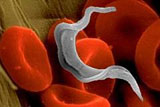RESEARCH
Eukaryotic Pathogenesis
Pathogenesis refers to the development and progression of a disease. Many single-cell eukaryotes can cause severe diseases to humans. Human body is a rich source of nutrients which the parasites require for survival, as long as they can overcome the obstacles of human innate and adaptive immunity. Immune responses do not need to be overcome indefinitely. Pathogens and host evolve over time to the state of balanced pathogenicity. In order to cause disease, pathogens must follow the common mechanisms of a)Adherence b) Colonization and c)Delivery of effector molecules. Until recently, very little was known about how eukaryotic pathogens deliver virulence determinants into their host cells and how the expression of the virulence factors are regulated. In our lab, we focus on the role of structural RNAs in virulence and pathogenesis of the malaria parasite Plasmodium falciparum and the parasitic agent of Trypanosomiasis.
Malaria

- A human infectious disease caused by a single cell parasitic protozoa — Plasmodium sp.
- 300–500 people diagnosed with malaria and approx one million people die each year worldwide
- Known to have pathological interactions with HIV in dual infections
- Plasmodium falciparum causes severe and life-threatening malaria; most common causes of lethality is cerebral malaria and multi-organ failure.
- Chloroquine, a 4-aminoquinoline drug discovered 70 years ago is still used as major treatment of malaria. There is now enormous challenge to treat malaria from chloroquine resistance worldwide.
Get perspectives on Malaria Pathogenesis from these papers and video:
- Click to see a video on Malaria life cycle.
- Malaria Pathogenesis (pdf)
Louis H. Miller, Michael F. Good, Genevieve Milon, Science vol. 264, 24 June 1994 - The pathogenic basis of malaria
Louis H. Miller, Dror I. Baruch, Kevin Marsh & Ogobara K. Doumbo, Nature 415, 673-679 (7 February 2002)
Trypanosomiasis

- Trypanosoma parasites are protozoa causing infection to domestic animals and humans
- Two major forms, In Africa Trypanosoma brucei causes “Sleeping Sickness” and Trypanosoma cruzi causes “Chagas Disease” in Southern America
- Trypanosoma brucei infects 250,000 to 300,000 people and approximately 55 million are at risk. Trypanosoma cruzi infects 20 million people and about 40,000 people die each year from Chagas’ disease.
- Drugs work in two stages, the earlier the identification of the disease, the better the prospect of a cure. Treatment success in the second stage depends on a drug (e.g. Melarsoprol) that can cross the blood-brain barrier to reach the parasite.
Get perspectives on Trypanosoma Pathogenesis from these papers and video:
- Click to see a video on Trypanosoma life cycle.
- Epigenetic regulation in African trypanosomes: a new kid on the block
Luisa M. Figueiredo, George A. M. Cross & Christian J. Janzen, Nature Reviews Microbiology 7, 504-513 (July 2009) - Antigenic Variation in Trypanosoma brucei: Joining the DOTs
Stockdale C, Swiderski MR, Barry JD, McCulloch R (2008) PLoS Biol 6(7): e185. July 29, 2008